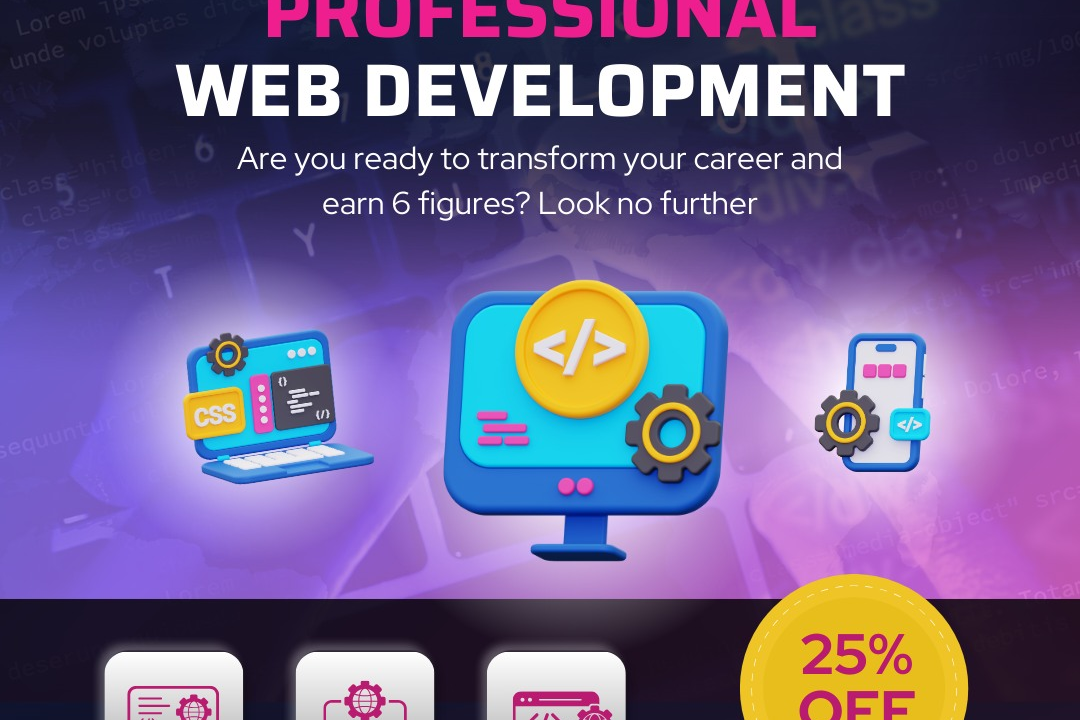selenium training courses in MUMBAI
Selenium training courses in Mumbai provide comprehensive education on the Selenium framework, a vit
selenium training courses in MUMBAI
Selenium training courses in Mumbai are essential for aspiring software testers and developers seeking to enhance their skills in automated testing. With the increasing demand for high-quality web applications, mastering Selenium allows professionals to streamline testing processes, improve efficiency, and ensure robust software performance. These courses offer hands-on experience through real-time projects, enabling participants to gain practical knowledge and build confidence in using the Selenium framework. By completing this training, individuals position themselves competitively in the job market, equipped with the latest tools and techniques needed to thrive in a technology-driven environment.
To Download Our Brochure: https://www.justacademy.co/download-brochure-for-free
Message us for more information: +91 9987184296
Selenium training courses in Mumbai are essential for aspiring software testers and developers seeking to enhance their skills in automated testing. With the increasing demand for high quality web applications, mastering Selenium allows professionals to streamline testing processes, improve efficiency, and ensure robust software performance. These courses offer hands on experience through real time projects, enabling participants to gain practical knowledge and build confidence in using the Selenium framework. By completing this training, individuals position themselves competitively in the job market, equipped with the latest tools and techniques needed to thrive in a technology driven environment.
Course Overview
The Selenium Training Courses in Mumbai are designed to provide participants with comprehensive knowledge and practical skills essential for mastering automated testing using the Selenium framework. The course covers fundamental concepts, including Selenium WebDriver, TestNG, and automation frameworks, ensuring a strong foundation in web application testing. Students engage in hands-on projects that mimic real-world scenarios, enhancing their problem-solving abilities and technical competence. With experienced instructors guiding each session, participants will learn best practices and industry standards, equipping them for careers in Quality Assurance and software development. By the end of the course, students will be proficient in developing, executing, and maintaining automated test scripts, making them valuable assets in any tech-driven organization.
Course Description
The Selenium Training Courses in Mumbai offer an in-depth exploration of automated testing using the Selenium framework, empowering participants with essential skills in web application testing. This course covers key topics such as Selenium WebDriver, TestNG, and the creation of automation frameworks, all delivered through a blend of theoretical knowledge and practical, hands-on projects. Students are taught by industry-experienced instructors, ensuring they gain insights into best practices and real-world applications. By engaging in real-time projects that reflect common challenges faced in the industry, participants will be well-equipped to develop, execute, and maintain automated test scripts effectively, preparing them for successful careers in Quality Assurance and software development roles.
Key Features
1 - Comprehensive Tool Coverage: Provides hands-on training with a range of industry-standard testing tools, including Selenium, JIRA, LoadRunner, and TestRail.
2) Practical Exercises: Features real-world exercises and case studies to apply tools in various testing scenarios.
3) Interactive Learning: Includes interactive sessions with industry experts for personalized feedback and guidance.
4) Detailed Tutorials: Offers extensive tutorials and documentation on tool functionalities and best practices.
5) Advanced Techniques: Covers both fundamental and advanced techniques for using testing tools effectively.
6) Data Visualization: Integrates tools for visualizing test metrics and results, enhancing data interpretation and decision-making.
7) Tool Integration: Teaches how to integrate testing tools into the software development lifecycle for streamlined workflows.
8) Project-Based Learning: Focuses on project-based learning to build practical skills and create a portfolio of completed tasks.
9) Career Support: Provides resources and support for applying learned skills to real-world job scenarios, including resume building and interview preparation.
10) Up-to-Date Content: Ensures that course materials reflect the latest industry standards and tool updates.
Benefits of taking our course
Functional Tools
1 - Selenium WebDriver: Selenium WebDriver is the core component of Selenium, enabling candidates to control browsers programmatically. Using WebDriver, students can create automated tests that simulate user interactions, such as clicking buttons, entering text, and navigating web pages. This critical tool supports multiple programming languages like Java, C#, Python, and Ruby, providing flexibility for learners to choose the language they are most comfortable with. Understanding WebDriver is fundamental to building robust automation frameworks.
2) Selenium IDE: The Selenium Integrated Development Environment (IDE) offers a user friendly interface for beginners to get started with automation testing. This tool allows students to record and playback browser interactions without writing code. It is useful for rapidly prototyping tests and for those who are new to automation. By learning to use Selenium IDE, candidates can quickly understand the basic concepts of creating and managing test cases before advancing to more complex scenarios.
3) TestNG: TestNG is a powerful testing framework inspired by JUnit and NUnit, providing advanced features such as annotations, data driven testing, and parallel test execution. In the training program, students learn how to organize their test cases effectively, manage dependencies, and generate comprehensive reports. TestNG supports integration with Selenium, making it an essential tool for automating and managing test suites, thus ensuring smoother workflows and efficient project management.
4) Maven: Maven is a build automation tool that assists in managing project dependencies and building scripts efficiently. In the context of Selenium training, students learn to use Maven for project structure management, enabling easy configuration and integration of various libraries and frameworks. This tool simplifies the setup of Selenium projects and ensures that all dependencies are automatically downloaded and updated, allowing trainees to focus on writing effective test scripts instead of dealing with manual configurations.
5) Cucumber: Cucumber is a tool for behavior driven development (BDD) that allows testers to write test scenarios in plain language. In JustAcademy’s Selenium training course, students explore how to create executable specifications using Gherkin syntax. This technique fosters collaboration among technical and non technical team members, as the tests are readable by all stakeholders. Learning Cucumber helps students design better test cases and promotes a clearer understanding of application requirements.
6) JUnit: JUnit is another widely used testing framework for Java applications. In the training program, students learn how to use JUnit to create and execute test cases, offering tools for asserting conditions and generating test reports. Understanding JUnit is essential for Java based Selenium projects, as it enhances test organization and execution efficiency. It also allows for integration with CI/CD pipelines, ensuring that tests run automatically as part of the software development lifecycle.
7) Page Object Model (POM): The Page Object Model is a design pattern that encourages the creation of an object repository for web elements. This pattern enhances test maintenance and reduces code duplication. In the JustAcademy Selenium training course, students are taught how to implement POM, allowing them to organize their code better and make it easier to manage test scripts. By separating the representation of web pages from test logic, students learn to create more readable and maintainable automation frameworks.
8) Continuous Integration and Continuous Deployment (CI/CD): The CI/CD process involves automating the integration of code changes from multiple contributors and deploying them to production seamlessly. In the Selenium training program, students gain insights into integrating Selenium tests into CI/CD pipelines using tools like Jenkins or GitLab CI. This knowledge empowers candidates to automate the testing process, running tests automatically whenever new code is committed, thus enhancing the overall development workflow and ensuring quicker feedback.
9) Cross Browser Testing: Cross browser testing is crucial for ensuring that web applications function correctly across different web browsers and devices. In the course, students learn to use Selenium Grid to run tests on multiple browsers and platforms simultaneously. This approach helps identify browser specific issues early in the development process, ensuring a consistent user experience. Understanding cross browser testing is key for developers and testers alike, particularly in a diverse digital ecosystem.
10) Data Driven Testing: Data driven testing is a methodology where test scripts can execute with multiple sets of data, enabling comprehensive testing scenarios without duplicating code. In the JustAcademy training program, students learn how to implement data driven frameworks using tools like Apache POI for Excel files or JSON for data sources. This approach helps students maximize test coverage, ensuring different input cases are thoroughly evaluated while maintaining clean and reusable test code.
11 - Headless Testing: Headless testing refers to running tests in a browser without a graphical user interface (GUI). In the training sessions, students explore how to configure Selenium to run tests in headless mode using browsers like Chrome and Firefox. This technique significantly speeds up test execution, especially in CI environments. Understanding headless testing is beneficial for students who aim to optimize automated testing, particularly in environments where user interface interaction is not necessary.
12) Handling Dynamic Web Elements: Modern web applications often feature dynamic elements that can change based on user interaction or AJAX calls. Students in the Selenium course learn techniques for handling such dynamic elements, including explicit waits, implicit waits, and fluent waits. This knowledge is essential for building resilient automation scripts that can handle the unpredictability of web applications while ensuring steady workflow without causing tests to fail erroneously.
13) Test Reporting and Logging: Comprehensive reporting is critical for analyzing test results and debugging failures. In the JustAcademy Selenium training, candidates learn how to implement test reporting using frameworks like ExtentReports or Allure, which provide detailed insights into test execution. Additionally, students are taught best practices for logging events during test execution to facilitate easier troubleshooting. Effective reporting equips students with the ability to communicate results more effectively to stakeholders.
14) Integration with Other Tools: To enhance the capabilities of Selenium testing, students learn about integrations with other tools, such as Docker for containerization, Apache Ant for build automation, and cloud services like Sauce Labs and BrowserStack for cloud testing. Understanding these integrations allows students to leverage modern DevOps practices, making their testing processes more efficient and scalable.
15) Behavior Driven Development (BDD): In addition to using Cucumber, students also explore BDD’s principles and how they can facilitate communication between stakeholders. This approach helps to ensure that development aligns closely with business requirements. Through BDD, candidates learn to create features and scenarios that provide clear, executable requirements, enhancing collaboration within teams and fostering a more agile development process.
These additional points further enrich the curriculum offered by JustAcademy, equipping students with a comprehensive skill set essential for success in automation testing using Selenium.
Browse our course links : https://www.justacademy.co/all-courses
To Join our FREE DEMO Session:
This information is sourced from JustAcademy
Contact Info:
Roshan Chaturvedi
Message us on Whatsapp:
Email id: info@justacademy.co












